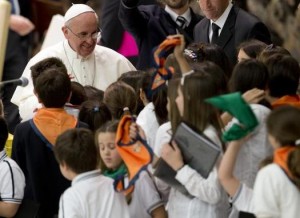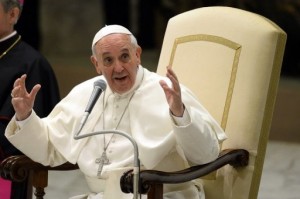On Pope Francis:
Posted by SociusJun 14
It is only three months since Pope Francis was elected Pope on 13 March 2013, and this leader of ours has broken the mould of who a Pope is, how he should behave, how he should speak, and what his priorities are. He is a real ‘breath of fresh air’ in the Church – fresh air that permeates right down to the people in the pews, and even to those who do not frequent the pews of our Churches. Already, he is not just breaking the mould of the papacy, but also of the Church, itself: he is changing the ways in which authority should be expressed – by bishops, priests, indeed, any person. He insists that the people – priests – should get out of the sacristies of the churches, and get involved with the poor, or those on the edge of society. The emphasis on ritual in the liturgy is being replaced by the inner spirit of the liturgy; there appears to be a greater openness and relaxation than ever before; there is a break-down of the ‘fear element’ when taking new initiatives, a basic commitment to the Gospel as the guide for life, rather than reliance on law and regulation. I perceive openness to all – in whatever state they find themselves.
 |
Pope Francis and some of the 9,000 Jesuit students
On the 7th June, for instance, Pope Francis, a Jesuit himself, met with 9,000 Jesuit pupils from Jesuit schools across Italy and Albania. He had a short address of ten minutes to give them but, seeing the enthusiastic love and support of all present, he said: “I’ve prepared a text but it’s a little long…I’ll give it to the Provincial so you can each have a written copy. Instead some of you can ask me questions and I will try to answer them”. This is actually what he did; it is not the usual way for a Pope to act! One cheeky little girl, with great simplicity, asked him if he had “wanted to become Pope?” After initial laughter, Pope Francis, with some hesitation and thought, answered: “Anyone who wanted to become a pope would not be doing himself a favour. God would not bless anyone who did … I didn’t want to become Pope.”
He celebrates Mass each day and delivers a short sermon. His practical words are eagerly followed all over the world – not least by the author of this blog! Apparently, in Argentina, his sermons as Archbishop of Buenos Aires were printed in the daily newspapers, as people were so keen to read them. On the day of writing this short article, the Pope’s homily at Wednesday morning Mass centred around Jesus’ words in the Gospel of the day: “Do not think that I have come to abolish the law or the prophets.” (MT 5:17).
“The hour of the law’s fulfilment, is when the law reaches its maturity when it becomes the law of the Spirit. Moving forward on this road is somewhat risky, but it is the only road to maturity, to leave behind the times in which we are not mature. Part of the law’s journey to maturity, which comes with preaching Jesus, always involves fear; fear of the freedom that the Spirit gives us. The law of the Spirit makes us free! This freedom frightens us a little, because we are afraid we will confuse the freedom of the Spirit with human freedom.”
 |
Pope Francis when he said he did not want to have the job of being Pope
In the above short paragraph, ‘moulds’ in our lives, that need ‘breaking’, are there. I want to mention a few but without any specific person in mind:
- Mould (1): For young people and older people that worshipping in Church is not ‘cool’; we can be united with God, but can easily ignore worship with others.
- Mould (2): That I am unable to go to Church because I have broken the rules of the Catholic Church.
- Mould (3): That priests and nuns and monks (Religious men and women of all orders) come from other peoples’ families, not mine own.
- Mould (4): That I have a routine in my life which is fixed and nothing can disturb it.
- Mould (5): That Jesus and God are not important for me to have fun and enjoy life; better without them.
- Mould (6): That there is not much I can do in this world to change it for the better.
At the previously mentioned interview with young people, somebody asked Pope Francis how should the young respond to the challenge of material, and spiritual poverty, in our world. This is how the Pope responded:
“First of all I want to tell you something, tell all you young people: don’t let yourselves be robbed of hope. Please, don’t let it be stolen from you. The worldly spirit, wealth, the spirit of vanity, arrogance and pride…all these things steal hope. Where do I find hope? In the poor Jesus, Jesus who made himself poor for us. … Poverty calls us to sow hope. This seems a bit difficult to understand. I remember Fr. Arrupe (Father General of the Jesuits from 1965-1983) wrote a letter to the Society’s centre for social research. At the end he said to us: ‘Look, you can’t speak of poverty in the abstract: that doesn’t exist. Poverty is the flesh of the poor Jesus, in that child who is hungry, in the one who is sick, in those unjust social structures. Go forward, look there upon the flesh of Jesus. But don’t let well-being rob you of hope. Young people should bet on their high ideals, that’s my advice. But where do I find hope? In the flesh of Jesus who suffers and in true poverty. There is a connection between the two.”
On this question of ‘hope’, I told a class in school that, since becoming Parish Priest in Leyland, I have dealt with quite a few suicides of young people, who must have lost hope. I think here we have a Pope who is helping people to find the sense of meaning of life, even when all might seem to be lost.
If you wish to watch a short clip about the audience on June 7th download:
http://www.thenational.ae/news/world/video-pope-francis-tells-children-why-he-forgoes-luxury
Father Jonathan.

No comments